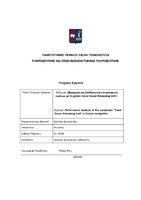| dc.contributor.advisor | Δουληγέρης, Χρήστος | |
| dc.contributor.author | Φωτόπουλος, Ιωάννης | |
| dc.date.accessioned | 2024-11-25T05:30:14Z | |
| dc.date.available | 2024-11-25T05:30:14Z | |
| dc.date.issued | 2024-09 | |
| dc.identifier.uri | https://dione.lib.unipi.gr/xmlui/handle/unipi/17096 | |
| dc.identifier.uri | http://dx.doi.org/10.26267/unipi_dione/4519 | |
| dc.description.abstract | Η Τεχνητή Νοημοσύνη είναι ένας από τους ταχύτερα αναπτυσσόμενους τομείς στην επιστήμη της Πληροφορικής. Το πρόβλημα που λύνει η συγκεκριμένη εργασία εντάσσεται στην περιοχή την σύγχρονων νευρωνικών δικτύων Τα σύγχρονα νευρωνικά δίκτυα διαχειρίζονται διεργασίες με μεγάλη πολυπλοκότητα και για αυτό απαιτούν μεγάλη υπολογιστική ισχύ. Οι σύγχρονοι επεξεργαστές γενικού σκοπού «δυσκολεύονται» να επιτύχουν επαρκείς και ικανοποιητικές αποδόσεις. Η Google ανέπτυξε τις Tensor Processing Units (TPUs) για να επιταχύνει την εκτέλεση εφαρμογών Τεχνητής Νοημοσύνης τόσο σε κέντρα δεδομένων όσο και σε λοιπές εφαρμογές, εκπληρώνοντας αυτό τον σκοπό. Σε αυτή τη πτυχιακή εργασία, ασχολούμαστε με τον Edge TPU. Το Edge TPU είναι ένα μικρό ολοκληρωμένο κύκλωμα που επιτρέπει την ανάπτυξη εφαρμογών ΤΝ “at the edge”. Το Edge TPU είναι ικανό να εκτελεί τέσσερα (4) τρισεκατομμύρια πράξεις ανά δευτερόλεπτο, χρησιμοποιώντας 2 Watt ισχύος. Ωστόσο, η αρχιτεκτονική και το σύνολο εντολών τέτοιων επιταχυντών ΤΝ, εμφανίζουν διάφορες προκλήσεις και περιορισμούς. Πραγματοποιήσαμε bench marking στο TPU, με έτοιμα μοντέλα που παρέχει η Google, με στόχο να αξιολογήσουμε τις δυνατότητές του. Τα αποτελέσματα που προέκυψαν αποκαλύπτουν σημαντική επιτάχυνση για το Google Edge TPU σε σύγκριση με τους επεξεργαστές BCM 2837 (Raspberry Pi 3, A+), AMD Ryzen 5 3500U. Συνολικά, επιτυγχάνεται σημαντική επιτάχυνση μεγάλου μεγέθους συνελικτικών νευρωνικών δικτύων και απλών τεχνητών νευρωνικών δικτύων. Το Edge TPU παρέχει έως και 10 φορές καλύτερη απόδοση από τον BCM 2837 και 7 φορές μεγαλύτερη απόδοση από τον AMD Ryzen 5 3500U. | el |
| dc.format.extent | 22 | el |
| dc.language.iso | el | el |
| dc.publisher | Πανεπιστήμιο Πειραιώς | el |
| dc.rights | Αναφορά Δημιουργού 3.0 Ελλάδα | * |
| dc.rights | Αναφορά Δημιουργού 3.0 Ελλάδα | * |
| dc.rights.uri | http://creativecommons.org/licenses/by/3.0/gr/ | * |
| dc.title | Εφαρμογή και ανάλυση στην αναγνώριση εικόνων με τη χρήση «Coral Tensor Processing Unit» | el |
| dc.title.alternative | Performance analysis of the accelerator "Coral Tenser Processing Unit" in picture recognition | el |
| dc.type | Bachelor Dissertation | el |
| dc.contributor.department | Σχολή Τεχνολογιών Πληροφορικής και Επικοινωνιών. Τμήμα Πληροφορικής | el |
| dc.description.abstractEN | Artificial Intelligence is one of the fastest-growing fields in Computer Science. The problem that this work solves belongs to the area of modern neural networks. Modern neural networks manage complex processes and therefore require a lot of computing power. Modern general-purpose processors "struggle" to achieve adequate and satisfactory performance. Google developed Tensor Processing Units (TPUs) to accelerate the execution of AI applications in data centers and other applications, fulfilling this purpose. In this thesis, we deal with Edge TPU. The Edge TPU is a small integrated circuit that enables the development of IT applications "at the edge". The Edge TPU can perform four (4) trillion operations per second, using 2 Watts of power. However, the architecture and instruction set of such AI accelerators present various challenges and limitations. We benchmarked the TPU, with ready-made models provided by Google, to evaluate its capabilities. The obtained results reveal a significant speedup for Google Edge TPU compared to BCM 2837 (Raspberry Pi 3, A+), and AMD Ryzen 5 3500U processors. Overall, a significant speedup of large-scale convolutional neural networks and simple artificial neural networks is achieved. Edge TPU provides up to 10x better performance than BCM 2837 and 7x better performance than AMD Ryzen 5 3500U. | el |
| dc.subject.keyword | Coral TPU | el |
| dc.subject.keyword | Neural network | el |
| dc.subject.keyword | Artificial intelligence | el |
| dc.subject.keyword | Machine learning | el |
| dc.subject.keyword | Object recognition | el |
| dc.subject.keyword | Artificial neural networks | el |
| dc.subject.keyword | Complex neural structures | el |
| dc.subject.keyword | Training algorithms | el |
| dc.subject.keyword | Machine learning accelerators | el |
| dc.subject.keyword | Tensor Flow Lite | el |
| dc.subject.keyword | TPU technology | el |
| dc.date.defense | 2024-09 | |



